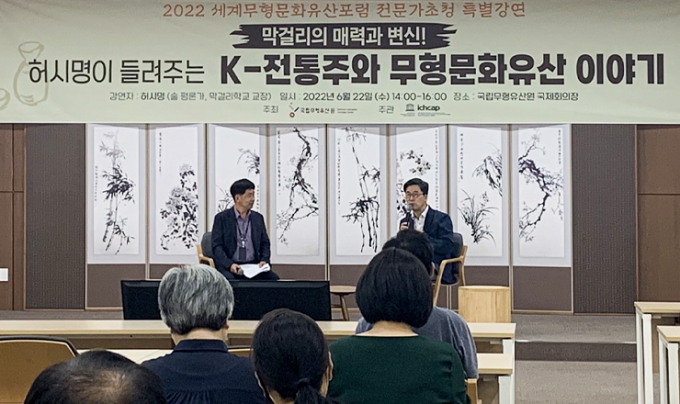Charms and Transformations of Makgeolli, Stories on K-Traditional Alcoholic Beverages and Intangible Cultural Heritage
 |
| A Scene of “Charms and Transformations of Makgeolli—Huh Si-myeong’s Stories on Korean Traditional Alcoholic Beverages and Intangible Cultural Heritage” Special Lecture © ICHCAP |
Korea’s first alcoholic beverage critic and travel writer Huh Si-myeong gave a special lecture “Charms and Transformations of Makgeolli—Huh Si-myeong’s Stories on Korean Traditional Alcoholic Beverages and Intangible Cultural Heritage” on 22 June 2022 at the National Intangible Heritage Center’s International Conference Hall under ICHCAP’s invitation.
This lecture was prepared to introduce the public to the topic of the upcoming World Forum for Intangible Cultural Heritage, ‘Traditional Knowledge, Thoughts and Practices Concerning Nature and Humanity.’ The forum will be held from 21 to 23 September at the National Intangible Heritage Center’s small performance hall.
Alcoholic beverage critic Huh Si-myeong explained
"If beer is liquid bread, makgeolli is liquid rice. The basic pairing for makgeolli is sweat, it is a drink for the fields and town squares… There aren’t many alcoholic beverages with names in pure Korean. Makgeolli is one, its name meaning an alcoholic beverage that has been filtered roughly with a sieve."
He also described different marketing methods to raise public awareness of makgeolli, the market value of makgeolli, success stories of makgeolli in Korea and other countries, and the value of makgeolli beyond the modern alcohol industry, containing traditional knowledge such as the optimal ratio of ingredients and fermentation time.
Huh stressed the importance of rice and water in making makgeolli, saying that its flavor is determined by these two factors. He also highlighted the traditional role of makgeolli as a medium to strengthen solidarity within the community. Makgeolli is low in alcohol content, and thus consumed from a large vessel. The traditional cup for makgeolli is the daepo (大匏), which means large bowl. Drinking makgeolli from a daepo allows the drink to be passed around the group. Passing the drink around is a ritual to confirm and reinforce loyalty to strengthen communal solidarity.
The lecture also included a makgeolli-making demonstration using a kit from the Makgeolli School. Huh also shared his knowledge on a wide range of questions from the audience in an hour-long discussion and Q&A session.
Huh also discussed the designation of makgeolli-making as a national intangible heritage in June last year, saying that
"The heritage includes not just the process of making makgeolli, but customs involved in the tradition from livelihoods to rituals and commemorations of life events. It has even greater significance as the first designation of intangible heritage based on suggestions from the public.
Commercially available makgeolli contains artificial sweetener, and makgeolli that doesn’t contain artificial sweetener might taste less smooth. However, honey or omija (magnolia berry) syrup can be used to make up for this difference. I strongly support the drinking of makgeolli without artificial sweeteners."
Huh Si-myeong’s special lecture was an engaging introduction to traditional knowledge for members of the public, with interesting and easily understood stories on the value of makgeolli as intangible cultural heritage containing traditional knowledge as well as the social and cultural role of the drink.

Address: 81, Laiguangying West Road, Chaoyang District, Beijing, China
Zip Code: 100021
Tel: 86-10-64966526
Fax: 86-10-64969281
E-mail: crihap@crihap.cn
Leave us your e-mail address, we'll let you know about current events.



